

Manipulating the microbiome could help manage weight. Vaccines and antibiotics may someday join caloric restriction or bariatric surgery as a way to regulate weight gain, according to a new study focused on the interactions between diet, the bacteria that live in the bowel, and the immune system.
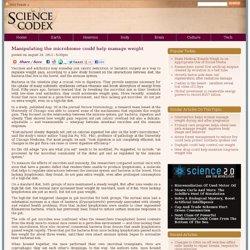
Bacteria in the intestine play a crucial role in digestion. They provide enzymes necessary for the uptake of many nutrients, synthesize certain vitamins and boost absorption of energy from food. Fifty years ago, farmers learned that by tweaking the microbial mix in their livestock with low-dose oral antibiotics, they could accelerate weight gain. More recently, scientists found that mice raised in a germ-free environment, and thus lacking gut microbes, do not put on extra weight, even on a high-fat diet. Microbes manipulate your mind. Microbes Manipulate Your Mind, in the July/ August issue of Scientific American MIND "The thought of parasites preying on your body or brain very likely sends shivers down your spine.
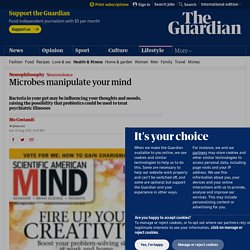
Perhaps you imagine insectoid creatures bursting from stomachs or a malevolent force controlling your actions. These visions are not just the night terrors of science-fiction writers—the natural world is replete with such examples. "Take Toxoplasma gondii, the single-celled parasite. La leche materna promueve un mejor crecimiento de la flora intestinal.
Aviso: Esta noticia tiene más de un año.
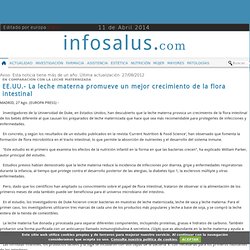
¿Peor el remedio que la enfermedad? >> Microbichitos. Gut bacteria could could play key role in development of type 2 diabetes. The number of people suffering from type 2 diabetes world-wide has risen rapidly in recent years, and scientists estimate that just as many people could be suffering from the illness without realising it.
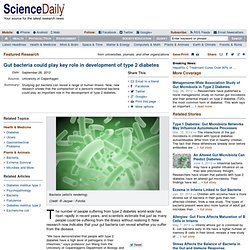
New research now indicates that your gut bacteria can reveal whether you suffer from the disease. "We have demonstrated that people with type 2 diabetes have a high level of pathogens in their intestines," says professor Jun Wang from the University of Copenhagen's Department of Biology and Novo Nordisk Foundation Center for Basic Metabolic Research. BDEBATE_UVIC_Sinopsi_SL_AMBportada_CAST.pdf. Microbiology: Microbiome science needs a healthy dose of scepticism. Eye of Science/SPL A scanning electron micrograph of bacteria in human faeces, in which 50% of species originate from the gut. Explorations of how the microscopic communities that inhabit the human body might contribute to health or disease have moved from obscure to ubiquitous. Over the past five years, studies have linked our microbial settlers to conditions as diverse as autism, cancer and diabetes. This excitement has infected the public imagination.
Luis J. Morán sur Twitter : "#lacteos (excluyendo queso debido a aporte d sal) enteros /desnatados y enfermedad #cardiovascular #microbiota @UIMP. Dysbiotic gut microbiota causes transmissible Crohn's disease-like ileitis independent of failure in antimicrobial defence. Introduction.
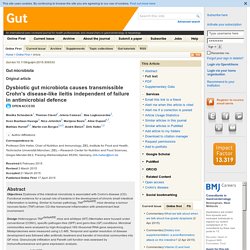
El estilo de vida occidental mata las bacterias que llevamos dentro. En su camino de progreso, los occidentales no solo están acabando con la vida que les rodea, también con la que llevan dentro.
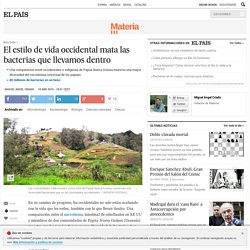
Una comparación entre el microbioma intestinal de estudiantes en EE UU y miembros de dos comunidades de Papúa Nueva Guinea (Oceanía) muestra que los papúes tienen mayor diversidad de bacterias. Las servidumbres del estilo occidental, con su higiene, su dieta o sus antibióticos, están llevando a la extinción a organismos que, en la mayoría de los casos, llevaban cientos de miles de años conviviendo con nosotros. Un número creciente de biólogos sostiene que cada ser humano es en realidad un holobionte (de todo y vida, en griego) formado por el humano y su microbioma.
Bonnie Feldman sur Twitter : "@NatureMedicine Good summary of #microbiome. Innovations in the Microbiome. Woman becomes obese after fecal transplantation from overweight donor. A woman who received gut bacteria from an overweight donor - for the treatment of recurrent C. difficile infection - rapidly gained 34 pounds in the 16 months after the procedure.
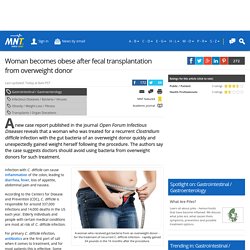
Infection with C. difficile can cause inflammation of the colon, leading to diarrhea, fever, loss of appetite, abdominal pain and nausea. According to the Centers for Disease and Prevention (CDC), C. difficile is responsible for around 337,000 infections and 14,000 deaths in the US each year. Elderly individuals and people with certain medical conditions are most at risk of C. difficile infection. For primary C. difficile infection, antibiotics are the first port of call when it comes to treatment, and for most patients this is effective.
Some patients, however, may experience recurrent C. difficile infection. Pin by Javier Casas Ciria on Microbiología. Eric Topol sur Twitter : The impressive interaction between our #microbiome and home: @sciencemagazine... Longitudinal analysis of microbial interaction between humans and the indoor environment. The bacteria that colonize humans and our built environments have the potential to influence our health.
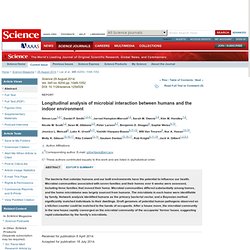
Microbial communities associated with seven families and their homes over 6 weeks were assessed, including three families that moved their home. Microbial communities differed substantially among homes, and the home microbiome was largely sourced from humans. The microbiota in each home were identifiable by family. Network analysis identified humans as the primary bacterial vector, and a Bayesian method significantly matched individuals to their dwellings. WE ARE NOT ALONE: How the Human "Planet" Is Colonized and a Gut Microbime Is Built. We Are Not Alone: How the Human "Planet" Is Colonized (video) ¿Somos lo que nuestras bacterias nos ordenan? >> Microbichitos. A veces se dice que somos lo que comemos, pero a la vista de varios descubrimientos publicados a lo largo de 2013 sería más acertado decir que somos lo que determinan las bacterias de nuestro aparato digestivo.
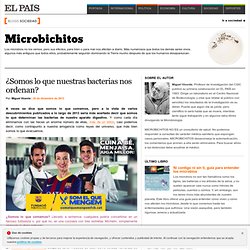
Y como cada día eliminamos con las heces un enorme número de ellas, más de un billón, casi podemos decir, como contrapunto a nuestra arrogancia como reyes del universo, que más bien somos lo que evacuamos. ¿Somos lo que comemos? Llevado a extremos cualquiera podría convertirse en un famoso futbolista o, por qué no, en una cocinera con tres estrellas Michelin, simplemente eligiendo la dieta indicada. ¿Es el final de las dietas milagro? Microbiota intestinal y salud (1ª parte) It's all in the guts. Treating disease with microbes: Bugs in the system. Understanding the Good Bacteria in Our Skin. Thomas D. Luckey, en 1972: Microbioma: Si... Gut Check : The microbiome game. Gut Check is a game for 2-4 players where each player attempts to develop a healthy microbiome while interfering with the microbiomes of their opponents.
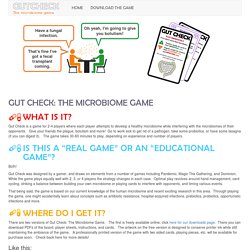
Give your friends the plague, botulism and more! Go to work sick to get rid of a pathogen, take some probiotics, or have some lasagna (if you can digest it). The game takes 30-60 minutes to play, depending on experience and number of players. Both! Gut Check was designed by a gamer, and draws on elements from a number of games including Pandemic, Magic The Gathering, and Dominion. That being said, the game is based on our current knowledge of the human microbiome and recent exciting research in this area.